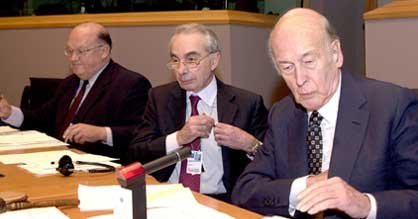After the rejection of the Constitutional Treaty by the French and Dutch electorates in 2005, the European Union retreated in a phase of reflection. As one of the key players in drafting the text as vice-president of the Convention, Giuliano Amato initiated the Action Committee for European Democracy (ACED)assembling 16 political personalities in autumn 2006. Aiming to assist the German and subsequent EU presidencies in finding a way out of the reform impasse, the ACED developed an elaborated work on the feasibility of an alternative and consolidated treaty. We interviewed Mr. Amato in the light of the results of the European Council presented on 21/22 of June 2007. In this meeting the Heads of State and Government agreed on a mandate for a subsequent Intergovernmental Conference (IGC) to be concluded before the end of 2007.
What has emerged in the preceding months as the “substance of the constitutional treaty” to be saved, was indeed largely included in the mandate which calls on an IGC to draft a reform treaty including the Constitutional Treaty’s innovations – except those exemptions explicitly mentioned and granted in particular to Great Britain (Charter of Fundamental Rights) and Poland (voting rights). The final document will take the form of a traditional treaty revision, amending the present framework of treaties and protocols and adding new adaptations. Following the rigid June mandate, the current Portuguese presidency has set itself a goal to complete the IGC as soon as possible to allow the ratification process to be completed before the next European parliamentary elections.
Mr. Amato, a comment on the outcome of the European Council: does the mandate for an IGC cast more lights or shadows on the future?
Yes, there is indeed rays of light and shady spots. Let’s start with the form. The structure is surely worse than the one of the Constitutional Treaty, but also than many proposals that have been put forward. The latter were attempts to depart from the constitutional character of the text. A legitimate goal shared by the Prime Ministers in order to avoid the ‘no’ of the referenda. Yet, for this reason they have considered a technique of amending the existing treaties article by article the most appropriate rather than working out a new treaty. However, the result is a less neat and less legible structure. It might be that the final text will end up better than it seems right now because the outcome will be an amply re-written Treaty of the Union, a Treaty of the Community which will embrace more technical modifications, and the Charter of Fundamental Rights.
Considering the substance and not the form, the number of straightforward losses compared to the Constitutional Treaty is relatively limited, meaning that the great majority of reforms that were considered useful, in a qualitative and not quantitive sense, has indeed been approved or at least not contested. The losses are:
2) competition disappears from the article on the objectives and is instead taken up again in a protocol; anyhow it remains mentioned in the basic articles on illegitimate legal bases, the abuse of dominant market power and so on;
3) the renaming of legal acts is left out. I was very much in favour of this, it would have meant that regulations would have been called laws, and directives framework laws.
Much, however, has remained. Anyway, what is really worrying is neither the form nor the substance, but the context. The context is made of a conjunction of declarations, some unilateral some not, and of protocols which are obstinately put together in order to introduce dozens and dozens of points. If taken in their sum, these additions mean: in everything we are doing there is actually nothing at all that would widen the competences of the Union, there is nothing in what we are doing from which one could infer a reduction of the member states’ privileges. Partly these are lies but obvious lies which the decision-makers deemed necessary to turn the opinion of the public to whom they do not offer anymore “the most”, but “the least Europe as possible”.
Do you think that this context marks a more fundamental change of the philosophy of “doing Europe together”?
In part I think so, yes. Up to date this has been predominantly, if not exclusively, a British position, shared by some of Great Britain’s neighbours. Now, with the East European States experiencing a revival of national sentiments after years of limited sovereignty it is very understandable that this trend occurs. They tune into the British tone, and for the European whole this means a reinforcement of the intergovernmental position.
Will referenda be necessary in some of the Member States?
Yes, they will be necessary. In Ireland due to an already established interpretation of the constitution I think it will be necessary and, we know, also in Denmark there will be a referendum unless a 5/6 majority is obtained in the parliament. In these two countries there will be a referendum. From this point of view it is a real pity that the option of an illegible text has been considered essential to please citizens, and surely this will present a difficulty, but in the atmosphere of mutual determination I honestly do not think that these two referenda should go wrong.
Is a coordination of the national ratification processes a feasible option, or is it still to early for this?
It is a bit too early to tell. Let us wait for the Intergovernmental Conference to finish. The advantage of the system chosen, i.e. a mandate by the European Council which is closed and already definite in all possible details about what the Conference will have to approve, rises the expectations on the IGC to be a short and quick episode. And thus we should be set to initiate the ratification process by the end of the year. At that point in time, we will see if a coordination of schedules shall be desirable.
Why the Action Committee for European Democracy? How did it emerge, what is the reasoning behind it?
We got together when faced with a pause for reflection which, when first proclaimed by the Community bodies after the French and the Dutch ‘no’, seemed to open a phase of consternation and a possible drift towards nothing. And it occurred necessary to us, as it did to others in other ways, to make sure that the pause for reflection would serve to reload the batteries instead of dumping the gadget. So we tried to recharge the batteries and it has been a marvellous experience. Since we have created a board of “men and women of good will” from all over Europe, working in close links with the European University Institute and the Robert Schuman Centre, the group consisted of young and older people, all of whom gave very positive responses. We often met in this constellation and more and more it was becoming clear what was to be done. This gave a special authority to our technical conclusions in comparison to many other contributions at the end of the reflection phase, and has made our work to be considered among the most recognised on the road to the desired goal. As a matter of fact, it was amongst the most appreciated proposals, and it was the closest to the possible conclusions of the European Council.
Was the European Convention a missed chance? What should be preserved from this experience?
No, it was not a missed chance. The fact that nowadays there is a ‘bundle of adaptations’ that will be successfully introduced in the treaties is only thanks to the work of the Convention. And if four years later it is now being recognised that Europe needs a number of institutional improvements, the very ones approved by the Convention, this gives proof of quality of the work produced by the Convention itself.
...the convention method made the discussions much more rational and more transparent
I deem this method has been highly useful to change the secret negotiations method of the preparation for the treaty adaptations. It puts all the opinions on an equal level and thus broke with the sacred value of sovereignty conveyed in the arguments by representatives of the States. Therefore it has made the discussions on the necessary modifications much more rational, much more transparent. It is certainly also the method for the future. Of course, one has to admit that in the end all one has done is handed over into the hands of the governments and that they can undo it and that there is a difference between the Convention and a constituent method, but this may be discussed further in future.
When has your pro-European engagement started? What was your “Erasmus” experience?
Certainly I belong to a very different generation. You young people get to know Europe by choosing a university outside your own country and you go to study abroad, where you also learn languages. I started university in the year in which the Treaty of Rome was signed, so ‘Erasmus’ did not yet exist in the 1950s. I must admit that I discovered Europe not in the political realm but only when I left to study in the United States: getting to learn about a federal system and thereby learning about the added value that a multi-level system of governance with continental dimensions could have. On this basis I subsequently came to appreciate Europe, although it is not a federal state. Paradoxically, this has made me very European but a little stodgy for the old federalists who, affectionate for models of past, are maybe less able than me to see that Europe is about to offer the world a model of governance which reunites this mix between international and internal law. I have thus celebrated Europe as ‘hermaphrodite’ which is, in a world of separated sexes, absolutely an improper being.



Follow the comments: |
|
